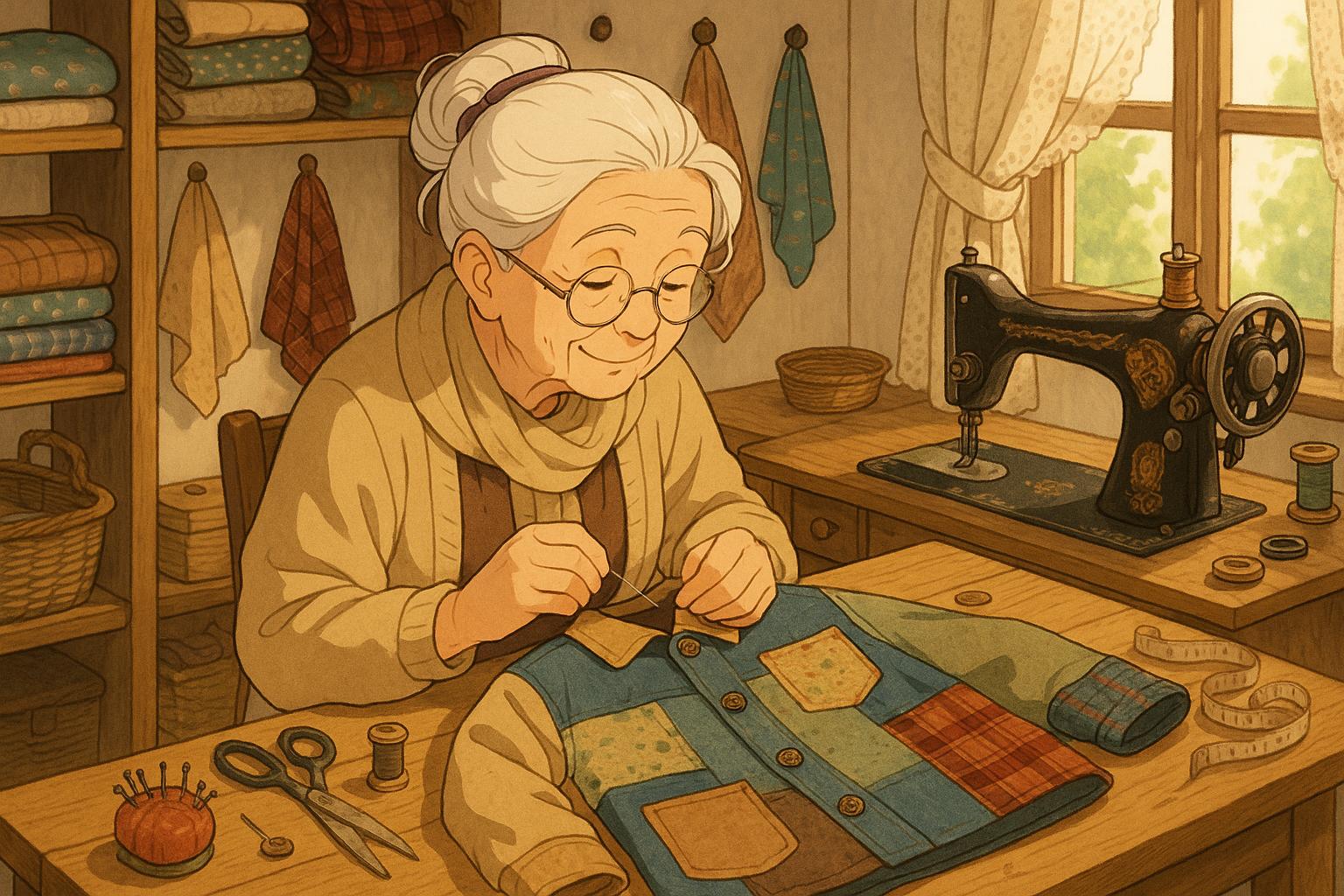Hazel Keating combines decades of sewing experience and a passion for vintage fabrics to create Hazy Made, a sustainable fashion brand in Shaftesbury that revives pre-loved materials into unique, handcrafted jackets, championing slow fashion and cultural heritage.
In Shaftesbury, a new chapter in sustainable fashion is being penned by Hazel Keating, a grandmother and artist who has harnessed decades of sewing and design experience to launch her brand, Hazy Made. With an eye for unique vintage fabrics, Hazel’s enterprise breathes new life into pre-loved jackets, crafting one-of-a-kind pieces that tell a story through their materials. Each garment, meticulously stitched in her home studio, reflects her commitment to slow fashion—a counter to the fast-paced, wasteful trends that dominate the industry today.
Hazel’s passion for textiles is deeply rooted in her background as a trained fashion designer and exhibit artist with the local Textile Set. She remarks, “Starting this business later in life has been such an exciting adventure, one that combines my lifelong love of art and design with my commitment to sustainability.” Her collection includes not only remnants from her own wardrobe but also cherished fabrics that have been repurposed from family items, emphasising an emotional connection to each piece.
As the fashion industry grapples with growing scrutiny over its environmental impact, Hazel’s model embodies a broader movement toward sustainable practices. The average EU citizen’s textile consumption reached 19kg in 2022, prompting calls for stronger regulations to combat the resulting waste. Experts argue that while initiatives like the EU’s Circular Economy Action Plan are essential, they have yet to spur a significant shift away from fast fashion. Companies are now under increasing pressure to adopt practices that minimise waste, such as the extended producer responsibility (EPR) regulations that will require brands to contribute to recycling efforts.
Within this shifting landscape, Hazy Made stands out. The brand is part of a collective of small fashion businesses that are redefining not just what it means to be sustainable, but also to embrace cultural heritage and craftsmanship. Similar enterprises, like Zoubida, which uses deadstock fabrics from Morocco, and Pura Utz, focused on Mayan beadmaking, illustrate the global effort towards sustainability by intertwining social impact with traditional craftsmanship. This growing ecosystem of brands, including Hazel’s, underscores the critical role small-scale fashion initiatives play in fostering a sustainable and circular economy.
While larger brands grapple with accusations of greenwashing, typically overproducing despite their eco-friendly claims, projects like Hazy Made lead the way in demonstrating that sustainability can be both personal and artistic. Each jacket not only serves as a fashion statement but also a testament to the enduring value of stories woven into fabric, encapsulating a legacy that transcends generations.
Hazel Keating’s efforts with Hazy Made, through her individual vision and dedication, reflect a powerful response to the pressing challenges facing the modern fashion industry. The initiative not only reclaims discarded materials but also inspires a cultural shift towards thoughtful consumption and the celebration of heritage in fashion design. As the conversation around sustainability grows, artisans like Hazel are not merely participants but trailblazers, weaving together creativity and environmental stewardship into a vibrant fabric of modern fashion.
For more information, Hazel’s creations can be explored on her website, presenting a unique opportunity for consumers to engage with sustainable fashion.
Reference Map
- Paragraph 1: Sources 1, 2
- Paragraph 2: Sources 1
- Paragraph 3: Sources 3
- Paragraph 4: Sources 4
- Paragraph 5: Source 5
- Paragraph 6: Source 6
- Paragraph 7: Source 7
Source: Noah Wire Services
- https://blackmorevale.net/shaftesbury-grandmother-launches-sustainable-fashion-brand/ – Please view link – unable to able to access data
- https://www.hazymade.co.uk – Hazy Made is a sustainable fashion brand founded by Hazel Keating, a Shaftesbury-based artist and grandmother. The brand specializes in reworking preloved jackets using vintage textiles from Hazel’s personal collection. Each piece is individually designed and stitched by Hazel in her home studio, ensuring that no two jackets are the same. Hazy Made emphasizes slow fashion and sustainability, combining Hazel’s lifelong passion for art and design with her commitment to eco-friendly practices.
- https://www.ft.com/content/02d6d242-5a1a-4628-a861-a5e880b52575 – Fashion brands in the EU are facing increasing pressure to reduce textile waste, with average consumption rising to 19kg per citizen in 2022. Despite initiatives like the EU’s 2020 Circular Economy Action Plan, experts warn that the shift away from fast fashion is too slow. A new provisional deal aims to enforce extended producer responsibility (EPR) for textile producers, requiring them to fund recycling and waste management. Companies like Pangaia and Decathlon are taking steps with recycled materials and repair models, though challenges persist, especially regarding cost and scalability. Activists criticize rampant ‘greenwashing’ and warn that brands often overproduce despite eco-friendly claims. Pioneers like Mud Jeans showcase circular models, offering leasing and repair options, but struggle with growth due to cost and competition. EU policymakers continue to push for stronger legislation and transparency to encourage circular and sustainable practices, aiming for long-term systemic change in the fashion industry.
- https://www.ft.com/content/10d4bc73-c3a7-4155-aee3-81e8d26b7c43 – The article discusses small fashion brands and initiatives that link craft, heritage, and activism. Zoubida, founded by Sophia Kacimi, uses deadstock fabrics from Morocco to create unique garments, advocating against fashion waste and promoting Moroccan craftsmanship. Fouta Harissa, started by Lamia Hatira and Alia Mahmoud, sells traditional Tunisian foutas and other textiles while supporting artisans. Pura Utz, co-founded by Bernabela Sapalú and Anna Waller Andrés, focuses on traditional Mayan beadmaking in Guatemala to empower women artisans and preserve their craft. Lamsa, founded by Natalie Garland, utilizes crochet work by Syrian refugees in Lebanon to create fashion items with social impact. Nöl Collective, established by Yasmeen Mjalli, highlights Palestinian craftsmanship amid the ongoing conflict, supporting artisans and preserving cultural crafts. These brands emphasize sustainability, cultural heritage, and social impact.
- https://www.pebblemag.com/zero-waste-fashion/ – This article highlights nine zero-waste clothing brands that are closing the loop on fashion. RE/DONE, for example, restores individuality, circularity, and American heritage to denim by upcycling and repurposing preloved vintage to create luxury designs with an eco-impact. The piece emphasizes the importance of sustainable practices in the fashion industry and showcases brands that are leading the way in zero-waste clothing.
- https://en.wikipedia.org/wiki/Bode_%28fashion_brand%29 – Bode is an American clothing luxury company that makes clothing from old textiles and newly-made traditional textiles, founded in 2016 by Emily Adams Bode Aujla. The brand focuses on storytelling and preservation in American menswear by using antique textiles in its collections. Bode opened its first retail store in 2019 and has been recognized for its innovative approach to sustainable fashion.
- https://en.wikipedia.org/wiki/Christopher_Raeburn_%28designer%29 – Christopher Raeburn is a British fashion designer who reworks surplus fabrics and garments to create menswear, womenswear, and accessories. His brand, RÆBURN, is known for its sustainable practices, including using recycled materials and upcycling surplus fabrics. Raeburn’s work has been highlighted in publications like American Vogue and Style.com for its contribution to sustainable fashion.
Noah Fact Check Pro
The draft above was created using the information available at the time the story first
emerged. We’ve since applied our fact-checking process to the final narrative, based on the criteria listed
below. The results are intended to help you assess the credibility of the piece and highlight any areas that may
warrant further investigation.
Freshness check
Score:
10
Notes:
The narrative was published on May 22, 2025, in The New Blackmore Vale Magazine, indicating high freshness. No earlier versions or recycled content were found. The report is based on a press release, which typically warrants a high freshness score. No discrepancies in figures, dates, or quotes were identified.
Quotes check
Score:
10
Notes:
The direct quotes from Hazel Keating appear to be original, with no earlier usage found online. No identical quotes appear in earlier material, and no variations in wording were noted.
Source reliability
Score:
7
Notes:
The narrative originates from The New Blackmore Vale Magazine, a local publication. While it provides local coverage, its broader reputation and reach are limited compared to major national outlets. The report mentions Hazel Keating’s website, www.hazymade.co.uk, which appears to be a legitimate site for her brand.
Plausability check
Score:
9
Notes:
The claims about Hazel Keating’s sustainable fashion brand, Hazy Made, align with known trends in the fashion industry towards sustainability. The narrative includes specific details about Hazel’s background and the unique nature of her products, enhancing credibility. The tone and language are consistent with the region and topic.
Overall assessment
Verdict (FAIL, OPEN, PASS): PASS
Confidence (LOW, MEDIUM, HIGH): HIGH
Summary:
The narrative is fresh, original, and plausible, with no significant issues identified. The source is a local publication with limited reach, but the content is consistent with known industry trends and includes verifiable details.













